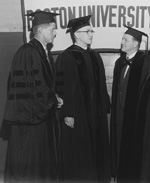Perspectives on the legacy of JFK
Remembering Kennedy on the 42nd anniversary of his assassination

Today, November 22, is the 42nd anniversary of the assassination of President John F. Kennedy. To mark the occasion, Thomas Whalen, a College of General Studies social science assistant professor, who wrote a book on Kennedy’s first U.S. Senate race, and political historian Julian Zelizer, a College of Arts and Sciences history professor, offer some perspective on JFK’s legacy.
Thomas Whalen:
When historians look back centuries from now concerning the legacy of JFK, they will remember three singular achievements: his deft handling of the Cuban Missile Crisis in 1962, his successful advocacy of putting a man on the moon by the end of the 1960s, and his commitment to civil rights for African-Americans during the fight to integrate the University of Alabama in 1963.
Of the three, the latter is by far the most significant. “We are confronted primarily with a moral issue,” he told his countrymen at the time. “It is as old as the Scriptures and is as clear as the American Constitution. The heart of the question is whether all Americans are to be afforded equal rights and equal opportunities, whether we are going to treat our fellow Americans as we want to be treated.”
He continued: “If an American, because his skin is dark, cannot eat lunch in a restaurant open to the public, if he cannot send his children to the best public school available, if he cannot vote for the public officials who represent him, if, in short, he cannot enjoy the full and free life which all of us want, then who among us would be content to have the color of his skin changed and stand in his place? Who among us would then be content with the counsels of patience and delay?”
No president since Lincoln had taken the bold step of placing the full legal and moral authority of the presidency behind the cause of civil rights. Now Kennedy had done so and the country and world would never be the same.
Julian Zelizer:
John F. Kennedy represents an era in American history when politicians still trusted their government. Americans look back to Kennedy and his presidency longing for the confidence that the nation once expressed toward its political leaders. To many Americans, he was Camelot — a sharp contrast to the memory of corruption and scandal that have surrounded so many presidents since 1963. In the post-Watergate era, no politician has been able to reclaim the kind of trust and excitement that so many citizens felt toward Kennedy.
Kennedy also symbolizes a period when liberalism was strong in America. In the current conservative climate, it is difficult to fully understand the powerful place that liberal ideas held in the political imagination. While Kennedy fell short on many goals, including civil rights, he championed a vision that built on the New Deal, one where the federal government would be used to resolve some of the biggest domestic challenges in the country. On foreign policy, Kennedy was a kind of liberal hawk who is usually absent from American politics today. This was an era when many Democrats championed a strong national security state and called on the U.S. to be extremely tough against its adversaries.
Finally, one of Kennedy’s most important legacies is to contribute to the increasing importance of image in American politics. Kennedy succeeded in large part because of how he looked and how he sounded. Since the famous Nixon-Kennedy televised debates in 1960, American politics has become more and more concerned with appearance and style. Whether one appreciates or dislikes this aspect of elections, Kennedy will certainly be remembered as one of the presidents who elevated the importance of this aspect of government through his career.